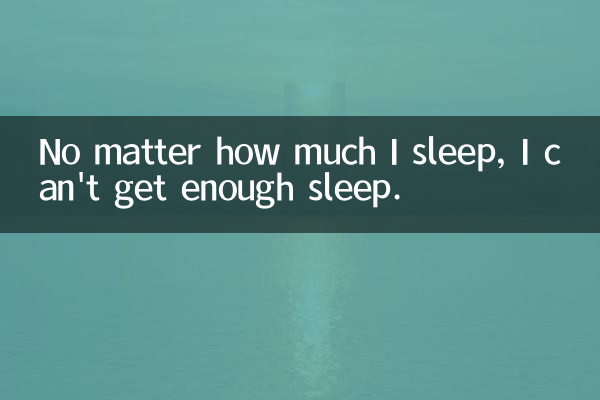No matter how much you sleep, you can’t get enough sleep: modern people’s sleep dilemma and solutions
In the past 10 days, discussions on topics such as "lack of sleep", "lethargy" and "can't get enough sleep no matter how much I sleep" have been very popular across the Internet. From social media to health forums, many people are complaining about feeling exhausted even after a long night of sleep. This article will combine recent hot data and scientific analysis to explore the causes and countermeasures of this phenomenon.
1. Data on sleep-related hot topics in the past 10 days

| Ranking | Topic keywords | Search volume (10,000) | Main discussion platform |
|---|---|---|---|
| 1 | No matter how much I sleep, I can't get enough sleep. | 45.2 | Weibo, Xiaohongshu |
| 2 | The reason why I always feel sleepy | 32.7 | Zhihu, Baidu |
| 3 | Poor sleep quality | 28.9 | Douyin, Bilibili |
| 4 | Feeling more tired after nap | 22.4 | WeChat, Douban |
| 5 | sleep cycle | 18.6 | Professional health website |
2. Why “I can’t get enough sleep no matter what”?
According to recent discussions and expert analysis, the main reasons include:
1.Poor sleep quality: Many people get enough sleep, but not enough deep sleep. Data shows that nearly 70% of respondents said they play with their mobile phones before going to bed, and blue light inhibits melatonin secretion.
2.Irregular work and rest: Recently, the topic of "staying up late with revenge" has been read more than 300 million times. It is common among young people to catch up on sleep on weekends and stay up late on weekdays.
3.seasonal factors: The natural law of spring sleepiness and autumn fatigue is superimposed on climate change. Nearly 30% of netizens said that they are particularly prone to sleepiness recently.
3. Scientific solutions
| method | Specific measures | Effect |
|---|---|---|
| Improve sleep environment | Keep the bedroom temperature between 18-22°C and use blackout curtains | Improve falling asleep speed by 30% |
| Adjust work and rest | Set a fixed wake-up time and do not catch up on more than 1 hour of sleep on weekends | Effective in 2-3 weeks |
| moderate exercise | 150 minutes of moderate-intensity exercise per week | Deep sleep time increased by 25% |
| diet regulation | Reduce high GI foods at dinner and do not eat 2 hours before going to bed | Reduce nighttime awakenings |
4. Effective tips tested by netizens
1."The 20 Minute Rule": Nap for no more than 20 minutes to avoid falling into deep sleep and becoming more tired after sleeping.
2.“Open the window as soon as you wake up”: Let sunlight inhibit melatonin secretion and wake up quickly.
3."Bedtime Ritual": Establish a fixed routine before going to bed, such as reading, meditating, etc., to cultivate sleep rhythm.
4."Caffeine Management": Do not consume caffeine after 2 pm to avoid affecting your sleep at night.
5. Special reminder
If you have a long-term problem of "not getting enough sleep no matter how much you sleep" and are accompanied by the following symptoms, it is recommended to seek medical treatment in time:
1. Excessive daytime sleepiness affects normal work and life
2. Apnea during sleep
3. Headache in the morning or significant decline in memory
Sleep problems should not be underestimated. Many recent studies have shown that long-term sleep deprivation will increase the risk of cardiovascular disease, diabetes, etc. I hope that the analysis and suggestions in this article can help everyone find a solution that suits them and have high-quality sleep.

check the details

check the details